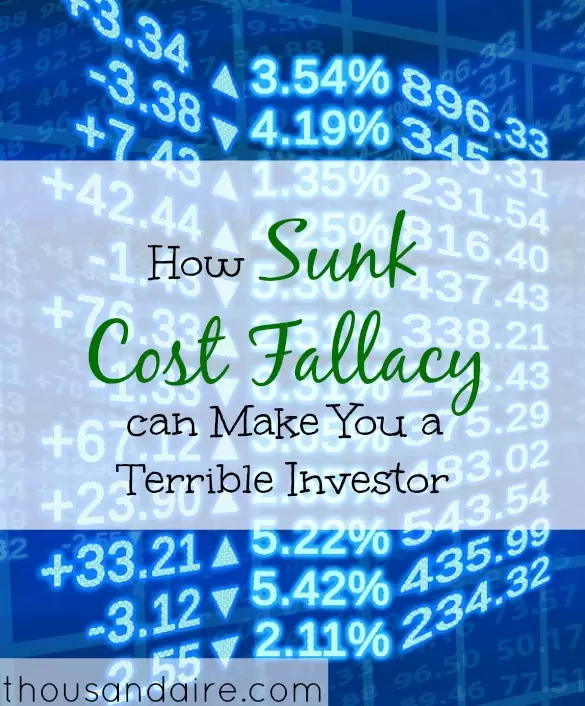 What is the sunk cost fallacy? The idea that any money or time you already spent on a thing matters. That money is gone. That time is gone. You shouldn’t let the time or money you spent on a bad idea keep you from throwing a bad idea away. Preferably far away.
What is the sunk cost fallacy? The idea that any money or time you already spent on a thing matters. That money is gone. That time is gone. You shouldn’t let the time or money you spent on a bad idea keep you from throwing a bad idea away. Preferably far away.
This comes up all the time. People finish terrible movies because they spent $10 to buy the ticket, rather than walking out of the theater and enjoying the rest of their evening doing something more interesting. This isn’t a very big deal with a movie, you lose, what, another hour or so? However, the effect is significant and unfortunately seems to become stronger when the stakes get higher.
Like in Investing?
Yup, the sunk cost fallacy is all over the place in investing. The major danger here comes from anchoring. No, this has nothing to do with newscasters.

When you initially buy a stock, people often get anchored to the price they paid for it (in investing parlance, your cost basis). If the price then, gets cut in half, or doubles they think about the new stock price relative to what they paid for the stock. This is exactly wrong.
What you paid for a stock should not enter into your analysis. It is a sunk cost. It might matter for your tax considerations, but if you own a company that is intrinsically worth $5 per share, that’s what it is worth. The only factors in your decision making should be the intrinsic value of the shares and the market price of the shares.
This seems obvious, but some of the earliest mistakes I made investing were related to this. The first stock I ever invested really heavily in was Safeway. They were making money hand over fist compared to the price of their shares, management was using that money to buy-back shares at a breakneck pace. It didn’t take a genius to figure out that something good would happen.

Not being a genius, I bought a significant amount at $15 per share. It went up a little bit, to $20 per share, and even though the company was still cheap relative to its intrinsic value, I sold, thinking I had made a great profit.
The nutty thing about this is that if I had discovered the opportunity 3 months later I would have bought it at $20 per share, but I was so focused on what I paid for the stock that the higher market price got me excited to sell.
The stock proceeded to get bought out for $30+ shortly later.
There is another side to this too, I had a friend that bought Microsoft at roughly $35 a few years ago. It proceeded to drop between $5 and $10, I don’t remember exactly how much. It concerned him a great deal to be “losing money” on the trade. It stayed low for a few months or a year and then went back up to $35. He was so excited once the stock was back at what he paid for it, that he sold immediately.
What he didn’t take into account was that Microsoft was then making even more money than when he originally bought the stock! As of this writing, Microsoft trades at $65 and has paid out a substantial amount of dividends as well. (I make no recommendation about Microsoft). Had my friend not been so focused on his sunk cost and instead focused on the business, he would have nearly doubled his money.
Dealing With It
This bias is extremely powerful and it’s hard not to feel that stocks that have gone up since you’ve bought them are somehow better than stocks that have gone down. Unfortunately, when deciding what you should keep in your portfolio what you paid for a stock (outside of tax considerations) shouldn’t matter to you at all! You should be only focused on whether the stock is more likely going to go up or down in the future not what it did in the past.
How do I deal with this? Use a broker that hides your cost basis from you. If you don’t remember what your cost basis is, it can help prevent you from making bad decisions because of your cost basis. For this, I like Loyal 3, but they have a very limited selection of stocks that they’ll trade.
Unfortunately, the bottom line here is that this is dangerous knowledge. Simply knowing it makes it more likely that you will do worse in the market.
Check out these articles:
Adam Woods is a physicist. His research interests include building software to run and build geomagnetic models. Adam got interested in personal finance in the great recession when it became obvious an interest was necessary.
After harassing his friends and family (and a short intervention) he took to the web where he blogs about finance, investment, politics, and economics.
Adam is currently located in Boulder, Colorado where he can generally be found hiking, biking, or running a D&D campaign. He can also be contacted at adamwoods137@gmail.com.



Interesting. I assumed you’d talk about people holding on to stocks as they were tanking because they’d spent more money on them. I hadn’t really thought of this mindset at the other end of the spectrum! Good food for thought.
Now I have had this issue in the other direction as well, but I previously talked about it in: “My Worst Investment — Ever“. That was really a circus of errors though…
I started to get into this mindset this week. I saw that one stock I bought has gone up $20/share since I bought it and how I wish I bought more while it was “cheap.” But, even if I buy it at the higher cost, I will still be making decent money from it since it’s dividends have gone up every time since I bought it.
This happens to me all the time as well. I find it harder to add to a good position if it is up significantly from my first purchases. They anchor me to what I think the stock is worth. It’s a mistake of omission that has cost me thousands.
Like Jamie, I was expecting you to apply this to people holding on to stocks, rather than letting them go too soon. But I can see how it could happen in both situations. Hiding the cost basis is a good idea, although I think the number would probably stay stuck in my head. Just understanding the bias should help at least a little.
This post reminded me a little too much of a few relationships I’ve been in. :oP
This is one of those things that applies pretty strongly to non-investing parts of life as well.